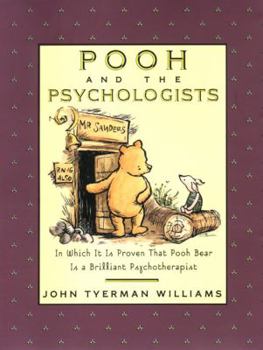Pooh and the Psychologists
Select Format
Select Condition 
Book Overview
'Winnie-the-Pooh lived in the forest all by himself under the name of Sanders and he had the name over the door in gold letters.' Why Sanders and why gold letters? Is the first letter of his title,... This description may be from another edition of this product.
Format:Hardcover
Language:English
ISBN:0525465421
ISBN13:9780525465423
Release Date:April 2001
Publisher:Dutton Books for Young Readers
Length:208 Pages
Weight:0.67 lbs.
Dimensions:0.9" x 5.3" x 7.5"
Age Range:13 to 17 years
Grade Range:Grades 8 to 12
Customer Reviews
1 rating
Satirical Ursinological Scholarship!
Published by Thriftbooks.com User , 23 years ago
The more you know about psychological theories and Winnie-the-Pooh, the more you will enjoy this book. Dr. Williams blasts away with tongue-in-cheek satire aimed at the psychologist's belief that everything that is said, thought, dreamed, and done has many layers of significance. Unfortunately, that approach means that your enjoyment will be modest if your knowledge is correspondingly limited in either area. If you know little about psychology and have not read Winnie-the-Pooh, you may not get most of the humor in the book. In Freud-like fashion, Dr. Williams begins by descrbing the case for Winnie-the-Pooh being a super psychologist. The thrust of this argument is that Winnie employs every method ever recommended by any psychologist or psychoanalyst somewhere in his fictional adventures. In fact, he often combines them in a single fictional encounter. The book then recounts seven cases and Winnie's role in them.Case 1 -- Pooh Cures Christopher Robin of Arktophobia (fear of bears)Case 2 -- Pooh Assists Piglet to MatureCase 3 -- Pooh at His Most Eclectic with Tigger Case 4 -- The Problem with RabbitCase 5 -- Parenting: Kanga and RooCase 6 -- Wol's Problems with CommunicationCase 7 -- Eeyore: A Case of Classical DepressionThe cases are written up like Freud's with the exception that they are illustrated with many drawings from the original Pooh stories. As an example of the approach, the book Winnie-the-Pooh opens with a reference to his living under the name of Sanders. That is never mentioned again. Dr. Williams provides a lengthy argument in favor of this meaning that Winnie-the-Pooh is describing himself as the Sand man, the bringer of dreams. This is an indication of his role as psychotherapist.In the famous story where Winnie eats too much honey and cannot get out of the hole in the tree, Dr. Williams reinterprets this as Winnie-the-Pooh making an example of himself to discourage others from overeating rather than using aversion therapy on them. To put this prescience into context, Dr. Williams points out that the Pooh stories date in the 1920s. In the text, he finds "frequent anticipation of theories and practices which more plodding psychologists arrived at much later." I don't know about you, but I didn't think much about Jung when I read Winnie-the-Pooh. Obviously, the references were too subtle for me.Those who have experienced psychotherapy will probably find humor in the observations made about Winnie-the-Pooh that they may have heard applied to themselves. Could the observations be equally apt? This book is best enjoyed by a roaring fire on a cold night with a warmed snifter of brandy, and savored slowly. After you have finished the book, you might consider the many instances where novels do show ways to solve psychological problems through their fictional developments. Could it be that we can use fiction to be our own therapist? Or, is someone else the therapist? If someone gave you the book, perhaps they are t






